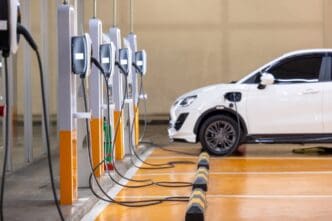President Donald Trump’s aggressive tariffs have rippled across the global economy, significantly affecting the auto sector, particularly the burgeoning electric vehicle (EV) market in the United States. The push towards electrification, marked by multi-billion-dollar initiatives, faces increased risks due to these economic policies.
Electric vehicles have gained traction in the U.S., comprising around 8% of new car sales in 2024. This growth has been partially spurred by expanded tax credits introduced during the Biden administration, which increased consumer interest. Tesla has maintained a dominant position in the U.S. EV market, holding a 48% market share in 2024. However, its dominance is waning as competitors like Ford, Chevrolet, and Hyundai offer a broader range of electric models at competitive prices.
Despite their rising popularity, electric vehicles remain more expensive than gasoline-powered cars. Recent data indicates that new gas vehicles sold for an average of $48,039, while EVs averaged $55,273. With tariffs contributing to rising costs, the transition to EVs, already marked by volatility and uncertainty, faces additional financial challenges.
The Biden administration’s tax credits have encouraged automakers to source more EV components from the U.S. or trade allies to qualify for incentives. This has driven significant investment into developing a domestic EV supply chain. Models like Tesla and the Ford F-150 Lightning are assembled in the U.S., with Tesla being relatively insulated due to its substantial U.S.-based production.
Nonetheless, tariffs maintain high costs for both manufacturers and consumers, potentially increasing the prices of components sourced from China and other regions. Automakers, already cautious about ambitious electrification plans due to reduced federal support, are financially strained by the less profitable EV segment of their businesses.
As tariffs drive up prices, consumers may turn to the used car market, though they may find little relief there. Fewer new vehicle sales could lead automakers to prioritize investments and manufacturing towards more profitable models. Despite substantial investments in EVs, manufacturers may reduce production levels to find a sustainable balance, affecting the potential for cost reduction in the near term.
The executive director of the Zero Emission Transportation Association emphasizes the commitment to expanding the American auto industry and the importance of productive trade policies. Tariffs on established trade partners, many of whom have invested in U.S. factories, introduce risk and uncertainty into an industry that is driving job creation and economic opportunities nationwide.
President Trump’s policies have also dismantled aspects of federal EV policy. His administration began with a pledge to dismantle President Joe Biden’s EV initiatives, which, while incentivizing increased electric offerings, did not mandate sales or purchases. The target for 50% of new vehicles to be electric by 2035 was abandoned early in Trump’s tenure. Additionally, the reevaluation of emissions standards by Trump’s administration could affect automakers’ strategies for meeting environmental goals through a mix of EVs and more fuel-efficient gasoline vehicles.
The Societal Shift
- Increased vehicle costs due to tariffs may limit consumer access to electric vehicles, potentially slowing the adoption rate and impacting environmental goals.
- Uncertainty in the auto industry could affect job stability and economic growth in regions relying on manufacturing and production facilities.
- Consumers seeking more affordable transportation options may turn to the used car market, influencing trends and pricing in that sector.
- Tariff impacts on supply chains might lead to higher prices for essential EV components, affecting overall production costs and vehicle affordability.
- Changes in environmental and emissions policies could alter automakers’ investment priorities, impacting long-term strategies for sustainable vehicle production.








